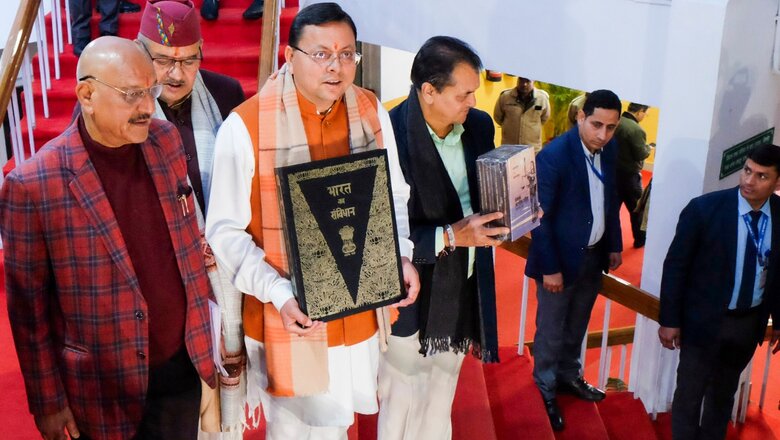
views
With a copy of the Constitution of India in hand, Uttarakhand Chief Minister Pushkar Singh Dhami entered the Assembly on Tuesday to table the Uniform Civil Code Bill.
The moment was hailed as “historic” by supporters of the bill and #UttarakhandCreatesHistory trended on social media. Treasury benches welcomed the tabling of the Uniform Civil Code (UCC) of Uttarakhand, 2024 Bill with thumping of desks and chants of “Bharat Mata Ki Jai”, “Vande Mataram” and “Jai Shri Ram”.
When passed, the 192-page bill will be the first such legislation to be implemented in any state after Independence.
The bill proposes a common law on marriage, divorce, land, property and inheritance for all citizens irrespective of their religion in Uttarakhand, excluding the Scheduled Tribes. It stipulates registration of live-in relationships in the state and imprisonment of three months for failure to do so within a month. Any child born out of such a relationship will be considered legitimate.
Here’s a look at the bill’s highlights:
Polygamy Banned
Under Section 4(i) of the bill, polygamy and polyandry has been disallowed. Defining who can marry, the section says: “Neither party has a spouse living at the time of the marriage”.
Sub-section (iii) of the above section fixes the age of marriage at 18 years for girls and 21 for boys.
It also disallows marriage with individuals whose relationship has been mentioned in the exception list. This includes people who have common ancestors, or relationship between a man and his widowed daughter-in-law.
Halala Banned
Section 30 of the UCC Bill bans the practice of halala, or marrying and divorcing a second man before remarrying the first husband. Section 30(ii) states: “The right to remarry includes the right to remarry the divorced spouse without conditions, such as getting married to a third person before such remarriage”.
Tribals Exempted
Section 2 of the Bill grants exemption to tribals. “Nothing contained in this code shall apply to the members of any Scheduled Tribes within the meaning of clause (25) of Article 366 read with Article 142 of the Constitution of India and the persons and group of persons whose customary rights are protected under Part XXI of the Constitution of India.”
Live-In Registration
The Bill makes it obligatory for partners of a live-in relationship within the state, whether they are residents of Uttarakhand or not, to submit a statement of their relationship under sub-section (1) of Section 381 to the Registrar within whose jursidiction they are living in a prescribed format.
It also says any child of a live-in relationship shall be a legitimate child of the couple. Live-in relationships in which at least one partner is a minor will not be registered.
Live-in relationships where the consent of one of the partners was obtained by force, coercion, undue influence, misrepresentation or fraud concerning the identity of the other partner will also not be registered.
The registrar will examine the content of the statement of live-in relationships to ensure that they are not of such a kind as mentioned under Section 380.
Anyone staying in a live-in relationship for more than a month without getting it registered will be punishable with an imprisonment up to three months or a fine of up to Rs 10,000 or both, the bill says.
A higher fine apart from an imprisonment of up to three months can be imposed on any person who provides false information in his or her statement on a live-in relationship to the Registrar.
If a woman in a live-in relationship gets deserted by her partner, she will be entitled to claim maintenance from him for which she may approach a competent court having jurisdiction over the place where they last cohabited.
Reactions to the UCC Bill
Uttarakhand Waqf board chairman Shadab Shams welcomed the legislation. Speaking to News18, he said: “Why should a Muslim woman who can’t bear a child be exempted from the option of adoption?” Shams welcomed the provision in the bill to give equal inheritance rights to men and women.
Ruksana Qureshi, a homemaker, however, disagreed. “Shariat says we can go for Haj only with Mehram, which can only be my biological son. An adopted or surrogate son doesn’t meet that requirement. This is not in sync with my faith,” she said.
Shams, however, pointed out that now the government is allowing Haj without Mehram. “I agree it will be tough to implement this provision. But just as change can be seen after Triple Talaq law, I am hopeful this too can be implemented,” he said.
Passing a legislation on the UCC will fulfil a major promise made by the BJP to the people of the state in the run-up to the 2022 Assembly polls, which saw the saffron party storm to power with a landslide victory for the second consecutive term. Several BJP ruled states in the country, including Gujarat and Assam, have expressed their keenness to follow the Uttarakhand UCC as a model.



















Comments
0 comment